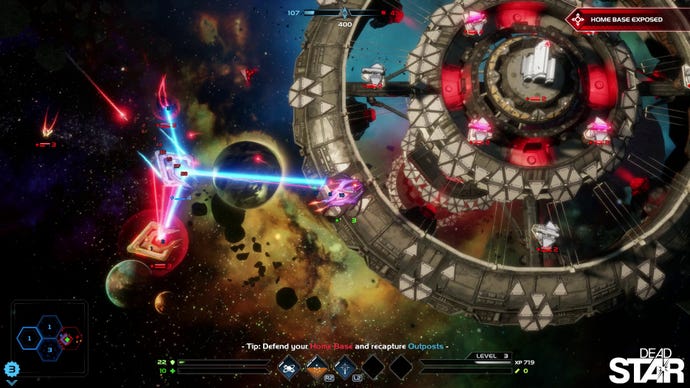Dead Star PS4 Review: Space Shooter Meets MOBA Variant
Here's something a little different: A top-down, multiplayer PvP shoot 'em up.
This article first appeared on USgamer, a partner publication of VG247. Some content, such as this article, has been migrated to VG247 for posterity after USgamer's closure - but it has not been edited or further vetted by the VG247 team.
Playing like a cross between a multiplayer Star Control and a MOBA variant, Dead Star is a top-down, twin stick PvP arcade shooter created by Armature, an Austin-based software studio that was founded by key members of the Metroid Prime development team.
There's no single-player aspect to the game, except for some very basic training levels. Instead it's a 10 versus 10 (or 5 versus 5, depending on the mode you choose) multiplayer PvP battle for territorial supremacy that plays out in competitive games that last around 15 minutes per round.
At the start of a game, players select their loadout, which involves choosing which ships they want to take into battle. There are three classes of vessels: A fast-moving scout, medium-strength raider, and a slow-moving but powerful frigate. Each class of ship has three variants, which feature unique upgradable weapons and abilities. Valant craft are more offensive in nature, and are armed with powerful weapons. Ithid are hit-and-run ships built for speed and capable of cloaking and teleporting. And finally, there's the Estari, whose ships can shield and repair friendly vessels, as well as provide offensive backup if needed using their lightning weapons.
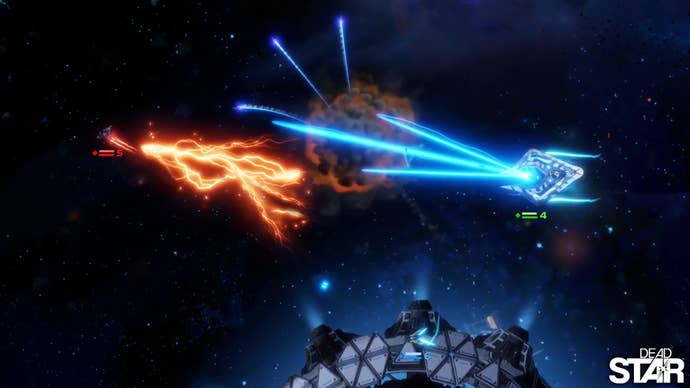
The primary game mode is conquest, and this takes place on a randomly-generated battlefield comprised of connected hexagonal-shaped sectors. Each team's home base sits at the opposite end of the playfield, and between them is a no-man's land where the battle plays out. The game's objective is to destroy the opposition's base, and that can be done in two ways: Either by controlling the sectors adjacent to the enemy's base, whereupon its normally-invulnerable shields are disabled and the base can be attacked and destroyed, or by gaining control of a guardian defense cannon, which can take out the enemy base in one shot.
The game is essentially all about controlling sectors, and to do that a team needs to capture the outpost found at its center by destroying its defenses, and then waiting in its capture zone long enough to gain control of it. Assuming your team successfully does this, the outpost is turned over to your side, and it starts generating resources. The first team to reach the round's resource target gains control of the guardian defense cannon, which immediately destroys the opponent's home base. This is the most straightforward way of winning, and most games I've played have either been won or lost this way. Taking out the base by controlling its adjacent sectors is a tougher proposition, and usually only happens when a team is dominating the opposition.
As well as capturing outposts, players can mine ore from asteroids and deliver the cargo to their home base or captured outposts to upgrade them. This improves their defenses, making them harder for the enemy team to take out, and also increases the rate at which resources are generated.
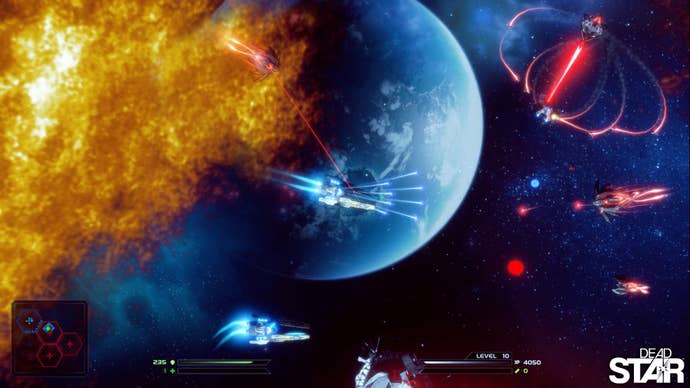
When a typical game starts, teams rush to capture outposts nearest to their base, but at a certain point they'll inevitably meet somewhere in the middle of the map. It's here where the battle begins proper, with players fighting one another to take control of outposts. In this situation, your choice of ship can be critical in helping turn the tide of battle. A fast-moving raider can be ideal for traveling to nearby outposts and capturing them quickly. However, if you then want to mine ore, it might be wiser to switch to a raider, which has an expanded cargo bay and more powerful weaponry for destroying asteroids and gathering their resources. Should the enemy be present at an outpost you want to attack – or if the enemy is assaulting one of your outposts, choosing a frigate is a good option. These slow-moving, but highly powerful ships are ideal for providing the spearhead for offensive and defensive strategies.
Whether you're collecting ore, capturing bases, or are simply shooting down enemy craft, you gain experience that enables you to upgrade your ships. In this fashion, you can add and improve offensive powers, as well as upgrade core functionality such as damage, defensive shields, health, and speed of movement. There's a large amount of options here, and it makes for some interesting strategic decisions. Do you go for an all-damage upgrade to create a vulnerable but offensively powerful ship, or do you upgrade your defenses first and make a more tank-like craft that's tougher to take down? Perhaps you might go for a mix, making a good all-round ship – or instead add new weapons, giving you more offensive options when it comes to engaging the enemy?
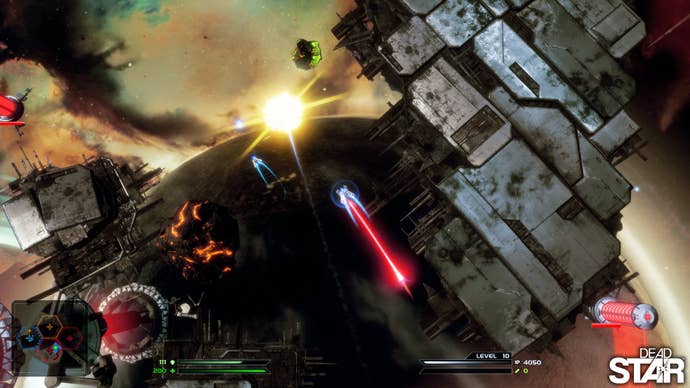
Whatever your choice, what this means is that the longer a game progresses, the more powerful its players get, and this helps make the action increasingly more intense and competitive. Towards the end of a battle, when players have fully upgraded their ships, this results in some spectacular firefights, with all manner of vessels and artillery flying around. Dead Star's highly detailed, colorful graphics really come into play here, and the game looks great as a consequence.
Although it sounds quite complex, Dead Star is easy to pick up and play. It's fundamentally an arcade shooter, and can be played like one – just flying around blowing up enemy ships is one way to make yourself useful. However, there's a lot more to it than that. Teaming up with other players and attacking or defending as a group is important – at least it is if you want to win. Then there are decisions to make about whether to stay and upgrade outposts to generate more resources, or push forward and attempt to capture more enemy territory. Or you might have to break off capturing an outpost because the enemy is attacking one of your own. Ultimately, these choices create quite dynamic gameplay where there always feels like there's something to do – and oftentimes you feel like you need to be in several places at once.
Adding further depth to the game is the loadout. Ships vary wildly in terms of their weaponry and abilities, and you'll no doubt find some ships more attuned to your playstyle than others. Indeed, it took me a while to find just the right loadout for my style of play, but once I did, my contributions to the game improved significantly. Different ships' abilities can also be complementary, allowing players to team up and become a force to be reckoned with – for example, one player defensively healing or shielding while the other lets rip with fully-upgraded weaponry. This helps enrich the gameplay somewhat, and add potentially interesting tactical choices when you're playing with friends and can coordinate as a group.
As you play games, you're awarded random components, depending on how well you do. These can be used to upgrade your ships outside of the game, so that you start with a slightly more powerful craft. Very rarely you're awarded a contract, and this enables you to take control of a giant Capital Ship ship with a group of other players and raid live games. Basically, you warp into a game, and have to survive a certain amount of time before you warp out - both teams can attack you, but you can respond in kind using the Capital Ship's arsenal. If you last long enough, you can eventually escape from Dead Star's solar system, which earns special rewards, such as rare character portraits for your player profile.
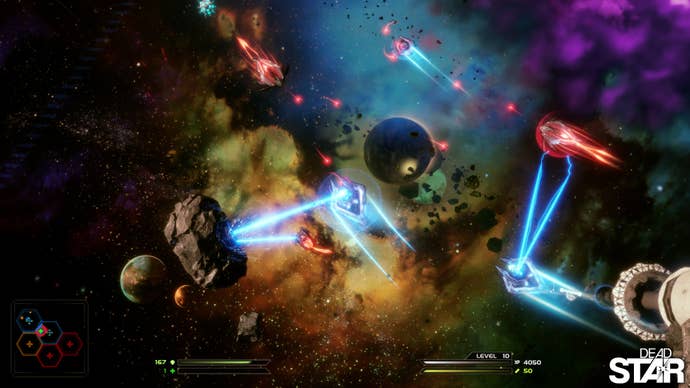
While I've really enjoyed playing Dead Star, one aspect of the game that does concern me is that, and this is anecdotal, but it is my experience nevertheless, I've yet to see a game in which a team that spools out an early lead in terms of resources loses. Basically, whichever team initially starts generating the most resources can quickly gain the upper hand, and the rest of the game simply becomes a foregone conclusion. Sure, I've experienced a few games where the scoring has been quite close, but so far, I have yet to see a come-from-behind victory. I'm sure it must happen, but for me it seems to be a rarity, and that's not good for the health of the game. If a game is essentially won and lost in the first few minutes of a round, that will result in players leaving a losing game early if they know it's unlikely that they'll win.
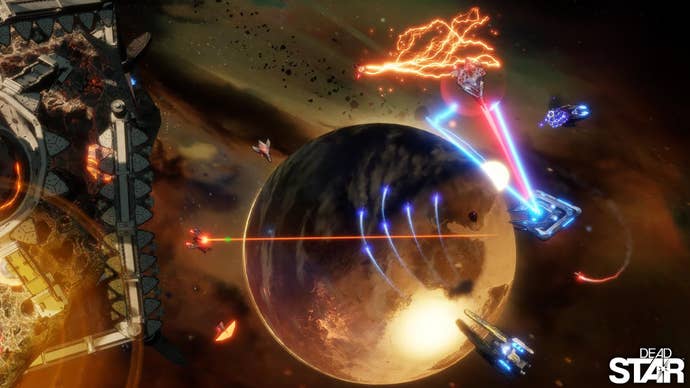
Hopefully that's just my experience, though, and other people are seeing games where the team that gets the early lead doesn't always win, and where scoring might be a little more back-and-forth. If it's not, though, I think some kind of rebalancing patch needs to be the order of the day to help make games more competitive over their duration.
That worry aside, I like Dead Star a lot. It took a few games to grow on me, but once I found the right loadout, and began to be able to read the game effectively in terms of where I should focus my efforts, I really warmed up to it. It delivers some intense action, and plenty of interesting strategic choices to make, from the ships you choose and the role you play on the battlefield to what you should be doing, and when. If you're a shoot 'em up fan, it's definitely worth a go.
Lasting AppealRandomly-generated levels help ensure that games are kept varied and interesting.
SoundThe soundtrack is somewhat repetitive, but the sound effects are generally good.
VisualsAlthough they don't look particularly impressive in screenshots, when Dead Star's graphics are moving, they're surprisingly rich and detailed.
ConclusionDead Star is a dynamic and entertaining mash-up of top-down shooter and open MOBA variant. It initially seems simple and straightforward, but the more you play it, the more its tactical and strategic depths become apparent. Ultimately, it's a really enjoyable game that offers intense, competitive PvP action, from exciting one-on-one dogfights to pitched battles involving many players.
